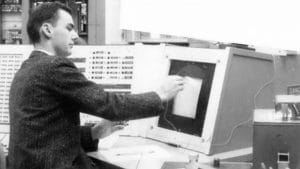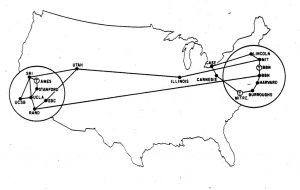Growing up in Westport, Conn., with two PhD chemist parents, Roberts decided on a different direction: “I wanted something new, not old like chemistry,” he said. He studied at the Massachusetts Institute of Technology, where he received his degrees — bachelor’s (1959), Master’s (1960), and Ph.D. (1963) — all in electrical engineering. During school he worked at MIT’s Lincoln Laboratory, a defense research and technology development center. Roberts was particularly interested in computer networking: in 1965, he had linked Lincoln Lab’s TX-2 computer to System Development Corp’s Q-32 computer in Santa Monica, Calif. Which is perhaps why he was lured away in 1967 to join the Defense Dept’s Advanced Research Projects Agency’s Information Processing Techniques Office to be the project manager for a new initiative there.

The new project had its genesis from a 1962 suggestion by computer scientist J.C.R. Licklider, who had described a concept he called an “intergalactic computer network.” He shortly after headed the Information Processing Techniques Office (1962-1963), and set up the organization to develop the idea, but it wasn’t funded by the time he left the agency. That became the job of his successor, Bob Taylor (Honorary Unsubscribe, 16 April 2017); he convinced the Agency’s director to fund it, which he did by taking a million dollars out of a ballistic missile program.
That’s where Roberts comes in: as the project manager, he doodled possible “maps” of what the new network might look like. He called on his computer scientist peers for suggestions, but it was his responsibility to decide what to choose from competing ideas. He rejected centralized control, where a failure could take down the whole network, and favored a distributed control scheme pioneered by Paul Baran. He chose “packet switching” as the data transport protocol, and worked with UCLA’s Leonard Kleinrock to model its performance — after all, packet switching was based on Kleinrock’s idea for “message switching,” as described in his PhD thesis. Roberts got the new network going in 1969: as it was funded by the Advanced Research Projects Agency, it was called ARPAnet — which evolved into the Internet.

Roberts thought that a network — the platform — wasn’t much good without something to do there, so he encouraged ARPA researchers to come up with useful applications to use it. One in particular, developed by Ray Tomlinson (Honorary Unsubscribe, 6 March 16), took hold: email. ARPA’s director “decided it was a great thing, and he made everybody in ARPA use it,” Roberts said in 1986. “So all these managers of ballistic missile technology, who didn’t know what a computer was, had to start using electronic mail.” Although, he said, Paul Baran had warned him, “One thing you ought to watch out for is you can’t send out personal message stuff, that’s illegal. That’s against the postal laws and you’ll be in jail in no time.” He ignored the warning, and “we didn’t happen to go to jail.”
Roberts left ARPA in 1973 to leverage the new network’s technologies; he founded or co-founded several companies, starting with Telenet, the first commercial packet-switched network. Back at ARPA, Vint Cerf and Bob Kahn developed the protocols for communications on the network: the Transmission Control Protocol and the Internet Protocol, or TCP/IP. That, using packet switching, is what the Internet still relies on today, in a distributed topology with no centralized control. In 1976, he was given IEEE’s Harry H. Goode Memorial Award for “his accomplishments in development and demonstration of packet switching technology and the ensuing networks which grew out of this work.” In 2001, Cerf, Kahn, Kleinrock, and Roberts were awarded the National Academy of Engineering’s Draper Prize “for the development of the Internet.” And in 2012, he was inducted into the Internet Hall of Fame. Dr. Lawrence “Larry” Roberts died at his home in Redwood City, Calif., on December 26, from a heart attack. He was 81.
Roberts’ Oral History in 2017:
